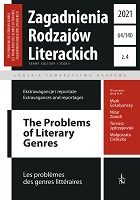„W każdej postaci mu się podobało, z wyjątkiem kamienia”. Posthumanistyczne figuracje w Baśni o wężowym sercu Radka Raka
“He enjoyed it in any form, except that of a stone”. Posthuman Figurations in Radek Rak’s The Tale of the Serpent’s Heart
Author(s): Michał KozaSubject(s): Studies of Literature, Polish Literature
Published by: Łódzkie Towarzystwo Naukowe
Keywords: posthumanism; Polish contemporary literature; fantasy; critical theory; materialism;
Summary/Abstract: The paper concerns posthuman and emancipatory contexts of Radek Rak’s novel The Tale of the Serpent’s Heart or Another Word about Jakób Szela. The story re-tells a fabled biography of Jakób Szela, the leader of the Peasant Uprising of 1846. The world created by the novel is subjected to non-human laws and relations, as well as to the feudal system. This fantastical-political juxtaposition exposes and deconstructs various inequalities sanctioning the exploitation of the peasant class. The paper points out three interpretative areas of the book, analyzed in the posthuman context. Firstly, describing the fantastical, non-anthropocentric imagination creating the novel’s world as a space of multiple relations and influences, usually non-existent in the historical works. Secondly, the paper focuses on the de-subjectification / virtualization of the subject. This particular point is discussed with references to other analyses of Rak’s novel, as the paper argues with some of the critical stances. Finally, it considers the genre’s distortion between mythical and historical which creates a space for alternative representations of the Peasant Uprising, escaping the dialectics of the “bad” and “good” legend. The paper’s closest methodological points of reference are texts of Rosi Braidotti (one of the most prominent posthuman philosophy scholars), Gilles Deleuze, and Felix Guattari. Using these tools, as well as author’s original propositions, the paper argues that the posthuman dimension of Rak’s novel expresses its critical effect, and postulates to change conservative relations in human and non-human relations.
Journal: Zagadnienia Rodzajów Literackich
- Issue Year: 64/2021
- Issue No: 4
- Page Range: 139-155
- Page Count: 17
- Language: Polish

